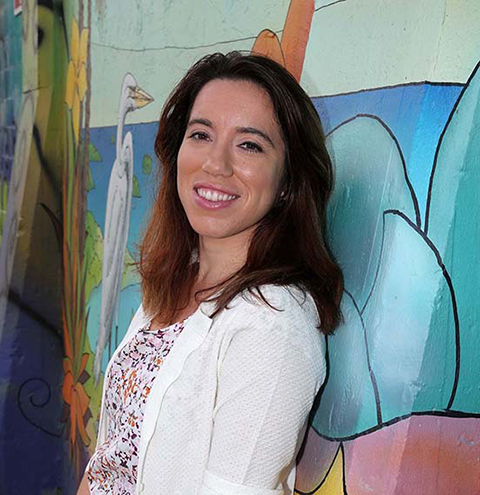Before Darleen Perez-Lavin started her intensive study of mathematics at Florida Gulf Coast University as a graduate student of Chilean lineage, she did not see many math enthusiasts who looked like she did. So Perez-Lavin, who now works as a research associate at the Naval Information Warfare Center in South Carolina, decided to help reconfigure that unbalanced equation.
A 2015 graduate of FGCU’s master’s degree program in applied mathematics, she collaborates in her role at the NIWC on projects designed to assist the U.S. Navy in developing and deploying technology-related warfare capabilities in areas including intelligence, communications, surveillance, reconnaissance and IT.

“I like to say that I work with a team of engineers, figure out their math and help them apply current math theory,” said Perez-Lavin, who received her bachelor’s degree in engineering management from Purdue University in 2008. She worked in construction management for five years before enrolling at FGCU, then went on to earn her doctorate in number theory at the University of Kentucky in May 2021.
“My position is research-based, so I spend most of my time reading current literature and figuring out how we can apply the current literature between math and engineering. Simply, I try to understand how engineers from different fields talk about math, then try to generalize it for the current need or application. This can be difficult, as we each define things slightly different,” she said.
For example, she is working with computer scientists attempting to apply projective geometry to a computer hardware device by understanding the math theory used in the application and generalizing it for use in different applications. She also is involved in a project to discern the math behind multi-objective optimization models and how to leverage those models in decision-making algorithms.
Pretty heady stuff for the math-phobic among us, but not so much for Perez-Lavin, who credits FGCU faculty including Erik Insko, associate professor of mathematics, for fanning the flames of her love of math. “The faculty at FGCU gave me motivation and inspiration,” she said. “They provided a safe atmosphere to learn and find my passion in math. Their courses helped build some initial foundation, but most importantly, they provided the connections and experience I needed during graduate school.”
They also encouraged her to attend mathematics conferences, including a USTARS (Underrepresented Students in Topology and Algebra Research Symposium) meeting co-organized by Insko. There, Perez-Lavin interacted with a diverse collection of mathematicians, including some sharing her Hispanic background. Among them were Federico Ardila from Colombia and Alex Diaz-Lopez from Puerto Rico, who specialize in combinatorics, and Pamela E. Harris, a Mexican-American mathematician and co-founder of Lathisms.org, a platform featuring the contributions of Latinx and Hispanic scholars in the mathematical sciences.
“I presented in front of some of the most famous combinatorists in the field and made connections with them,” Perez-Lavin said. “This single opportunity opened so many doorways into my success. At every conference I attend, even now these initial mathematicians like Dr. Ardila, Dr. Harris and Dr. Diaz-Lopez still say ‘hi’ and check in. This was where my math family began, and I am most grateful.”
Insko would later encourage Perez-Lavin to participate in the Field of Dreams Program, which works toward greater diversity in mathematical and statical sciences. That led to her acceptance into the doctoral program at the University of Kentucky, where she decided against a career in academia in favor of applied mathematics. “Every conference I attended, I would network with those who were mathematicians and worked in national labs or industry. The common message I received was to study what I love and take classes in other areas. So I picked number theory and took a variety of classes in analysis and other disciplines.”
During her doctoral program, Perez-Lavin received a National Science Foundation internship with the Department of Energy, where she worked to help solve a particle physics problem, and a prestigious Department of Defense Science, Mathematics and Research for Transformation (SMART) fellowship to complete her studies at Kentucky.
Insko characterized Perez-Lavin as “incredibly fearless” for switching gears after establishing a career in construction management. “Though she was still working as a contractor while studying at FGCU, she was remarkably dedicated to her classes and she was active in the FGCU community,” he said. “Darleen was not afraid to try new things and was unfazed if she failed on the first couple of tries. I think that is an essential trait in a research mathematician. We spend all day tackling challenging abstract problems, and finding the right answer takes a lot of trial and error.”
Perez-Lavin’s story is another example of how FGCU gives students the chance to transform their lives through hard work and study while staying close to home, Insko said.
“Darleen had already established a successful career when she first stepped onto FGCU’s campus, but she was able to use her time at FGCU to retrain and transition into a more challenging and satisfying career in mathematics,” he said. “I am pretty sure that the opportunities set her up for success in her Ph.D. program at the University of Kentucky and her internships as a SMART fellow.”
Perez-Lavin believes it is important for FGCU to continue helping more women and members of the Hispanic community study toward professions in the science, technology, engineering and mathematics (or STEM) fields. “The goal is to not see the name or what the person looks like, but to judge them on how well they will do their job,” she said. “With diversity comes change. If we all act and think alike, there will be little progress.”
